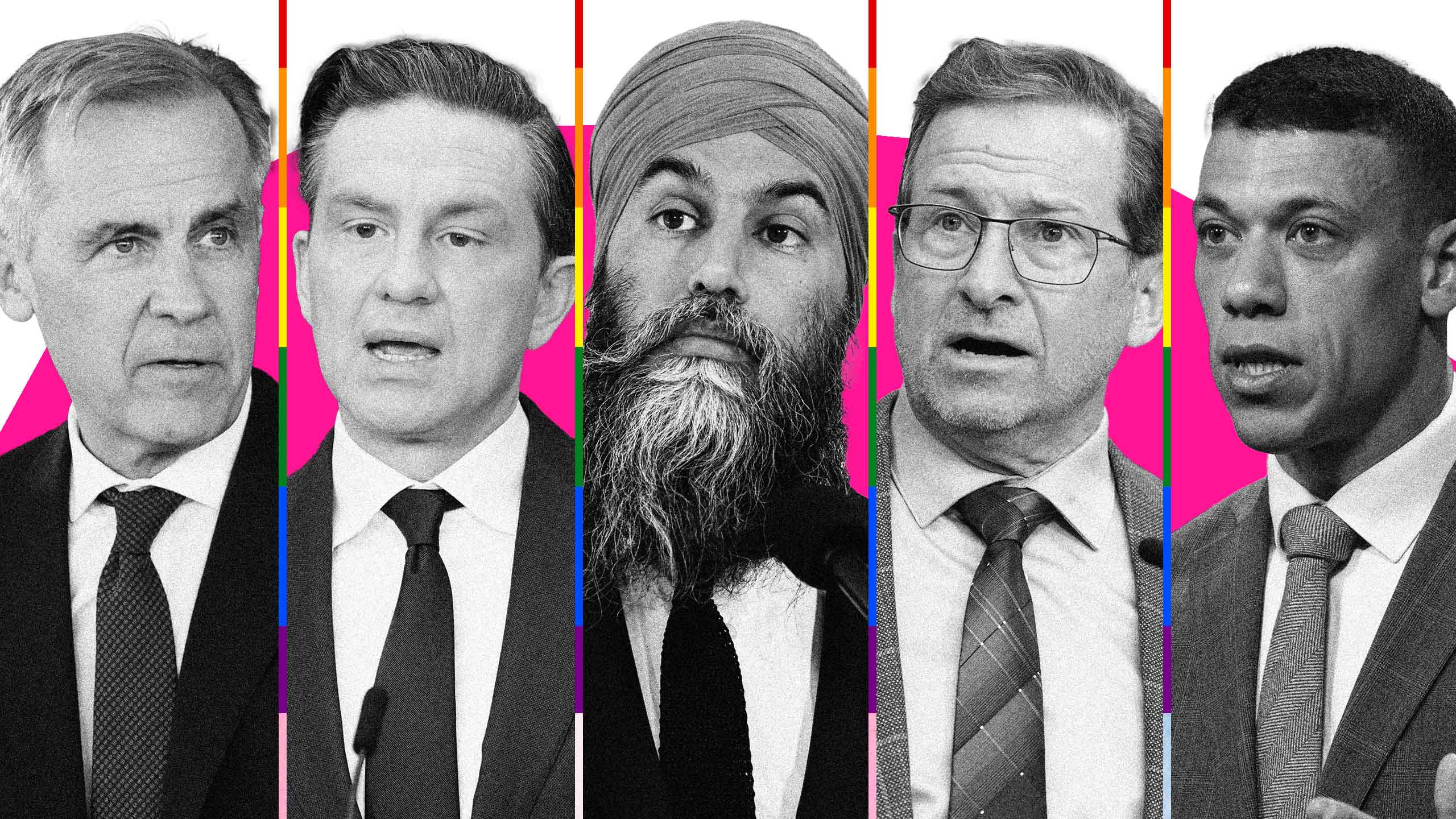There’s no doubt that Canada has made positive efforts to advance the civil rights of queer and trans people throughout the last decade. But if party platforms in the 2025 federal election are any indication as to whether that progress will be maintained, LGBTQ2S+ groups should be concerned.
Under the previous Liberal government, the country saw unprecedented funding programs, an end to conversion therapy practices, positive changes to blood bans, amendments to the criminal code, a historic apology and Justin Trudeau became the first prime minister to march in a Pride parade.
This progress has elicited backlash from right-wing Conservatives and further deepened divisions, culminating in a period of increasing political hostility, animosity and polarization that cemented during the COVID-19 pandemic.
Since then, numerous LGBTQ2S+ issues, from trans participation in sports to diversity, equity and inclusion in the workplace, have been caught in the crosshairs of the political culture wars, mirroring the political climate of the United States.
As Canada’s political party leaders battle it out ahead of a snap election set for April 28, 2025, Xtra asked all five major parties about five hot-button issues that are dominating the political discussion. The Conservatives and Bloc Québécois did not respond. The Green Party answered every question. Meanwhile, the Liberals and NDP responded with general statements.
DEI rollbacks
One of U.S. president Donald Trump’s first moves after being re-elected was to sign an executive order ending “radical and wasteful” Diversity, Equity & Inclusion (DEI) policies in the federal workforce, and in government contracts and spending.
The move elicited reactions from U.S. tech giants like Amazon, Meta and Google, who quickly moved to scrap their DEI initiatives. Canadian companies like Shopify and Molson Coors have also followed suit.
Xtra asked Canada’s political leaders if DEI rollbacks are the right direction for the country.
On multiple occasions, Conservative leader Pierre Poilievre has denounced DEI policies as “garbage” and called them “radical political ideologies” that are “completely out of touch with the values of Canadians,” as reported by right-wing blogs like True North and Western Standard.
Earlier this year, his campaign chair and former girlfriend, Jenni Byrne, lambasted her own party’s former leader, Erin O’Toole, after he sent a congratulatory message to Liberal cabinet minister Anita Anand.
Byrne took to social media to criticize Anand for supporting DEI policies during her tenure as defence minister.
While Liberal leader Mark Carney hasn’t commented publicly on the DEI culture wars, one of his first moves as prime minister was to downsize his cabinet and eliminate two key positions: Minister for Women, Gender Equality and Youth, as well as Minister of Diversity, Inclusion and Persons with Disabilities.
After his swearing-in, Carney explained that his cabinet is leaner because it’s “focused on the issues that are most important to Canadians, meeting the moment—the moment is a moment of crisis.”
DEI advocates quickly slammed the decision as an “alarming development” that deprioritizes the rights of vulnerable groups.
Jagmeet Singh’s NDP calls DEI rollbacks “harmful” in an email to Xtra, and blames U.S. president Donald Trump for spreading “hateful” and “divisive” rhetoric.
The Green Party says they “firmly oppose rollbacks of Diversity, Equity, and Inclusion (DEI) policies in both public and private sectors.
“Our platform is rooted in advancing equity,” a Green Party spokesperson told Xtra. “We would dedicate research funding to underrepresented groups, fully implement a national action plan to eliminate gender-based violence, and stand against hate targeting women, 2SLGBTQIA+ people, Indigenous peoples, racialized communities and others. We are committed to making Canada safer and more welcoming for all.”
The notwithstanding clause
Over the last several years, multiple Conservative-run provinces across Canada have used the Notwithstanding Clause to impose anti-trans legislation. That section of the Charter allows governments to override constitutionally protected rights.
The increased use of that clause has spurred fierce debate, with public opinion polls suggesting that the majority of Canadians view it as “problematic” and would like it abolished.
Xtra asked each party if they support using the notwithstanding clause to override Charter-protected rights.
While the federal Conservative Party hasn’t said anything about using it to defeat trans rights, Poilievre has hinted that he’ll use “whatever tools the Constitution allows” to change Canada’s criminal justice system.
In recent weeks, Mark Carney has slammed Quebec’s right-leaning government for preemptively using the notwithstanding clause to advance a 2022 language law known as Bill 96.
“I have a problem with that in any circumstance, whether it’s labour laws here in Ontario or whether it’s in that circumstance,” Carney told reporters on March 31. “These should be decisions directly for the courts.”
NDP leader Jagmeet Singh has previously called it a “clause to suspend democratic rights” and said his party is working to find ways to limit its use.
The Green Party of Canada has also taken a stand against the pre-emptive use of the notwithstanding clause, saying, “We believe this clause should only be a true last resort in exceptional cases. We support restricting its use to better protect the fundamental rights and freedoms of Canadians,” a spokesperson told Xtra.
Trans athletes’ participation in sports
Trans athletes have become a lightning rod in the ongoing culture wars, with critics raising concerns about inclusion, fairness and the potential for unfair competitive advantages. Others suggest that it’s discriminatory and unjust to exclude trans people from sports.
Xtra asked party leaders where they stand on the issue.
Conservative leader Pierre Poilievre has previously supported banning trans women from women’s sports teams, change rooms and bathrooms.
In February 2024, he told reporters, “Female spaces should be exclusively for females, not for biological males.”
His stance on the issue comes after Conservative Party delegates voted overwhelmingly to adopt a bathroom-style bill at their 2023 convention in Quebec City.
The policy proposal asked for Conservatives to acknowledge that “women are entitled to the safety, dignity and privacy of single-sex spaces (e.g., prisons, shelters, locker rooms, washrooms) and the benefits of women-only categories (e.g., sports, awards, grants, scholarships).”
When asked about the issue, a Liberal Party spokesperson did not answer the question directly, but said in a statement, “Mark Carney will defend Canadians’ Charter rights proudly and consistently, as the Liberal Party has, which includes the rights of 2LSGBTQI+ people.”
The NDP replied to this query with a statement from Edmonton Griesbach candidate Blake Desjarlais, who said, “Right now, in Canada, trans, Two-Spirit and gender-diverse people continue to be denied full equality, denied the freedom to be themselves and denied the safety and acceptance every Canadian deserves. It’s unacceptable.”
“The NDP has been leading the fight for trans rights for over a decade, including successfully adding gender identity and gender expression to the Canadian Human Rights Act and Criminal Code,” the party explained.
Meanwhile, the Green Party says they “strongly oppose discrimination against trans and non-binary Canadians.”
“Our platform commits to upholding their right to participate fully in society, including access to gendered spaces aligned with their identity,” a spokesperson said by email.
Gender-affirming medical care for trans youth
Since 2023, more than two dozen states in the U.S. have passed legislation to either limit or outright ban gender-affirming care for trans youth.
Trans healthcare—much like reproductive rights, vaccines and firearm safety—has become a hot-button issue as part of a broader culture war against public health. While these issues may seem unique to the U.S., experts say Canada is not immune from the right-wing extremism happening south of the border.
Xtra asked Canada’s federal parties if they support similar bans on gender-affirming care.
Conservative Leader Pierre Poilievre has taken a strong stance against gender-affirming medical care for trans youth.
In February 2024, he told reporters on Parliament Hill that he does not support puberty blockers for trans kids.
“Puberty blockers for minors? I think we should protect children and their ability to make adult decisions when they’re adults,” Poilievre said.
He also caused an uproar earlier this year after telling a reporter that he wasn’t “aware of any other genders than man and woman.”
Liberal leader Mark Carney shared his position on gender-affirming care at a campaign stop in Alberta earlier this month.
“Canada is a mosaic,” Carney explained. “We are all Canadians, but we all have different identities and distinctions. And one of the great strengths of this country is recognizing that people can be who they are. They can love who they love. They can live where they want to live.
“It’s fundamentally important that the federal government is the defender of those rights, defender of the Charter of Rights and Freedoms,” he added. “Access to healthcare in Canada is not a business. It is a fundamental right, and we will defend it for all Canadians, without exception.”
When asked about the issue, the NDP told Xtra they would “make sure people can get the gender-affirming care they need, and work with trans and gender-diverse organizations and fight to combat gender-based and trans-based violence.”
The Greens are also taking an aggressive stance on the issue, saying, “We unequivocally support access to gender-affirming care. We would protect the right to gender-affirming healthcare as part of basic health rights. We trust the expertise of healthcare professionals and human rights frameworks to guide decisions, not politics.”
“Every young person deserves access to affirming, safe and necessary care,” a GPC spokesperson wrote.
Canada’s $100M Action Plan for 2SLGBTQI+ communities
In 2022, the previous Liberal government under Justin Trudeau made a historic commitment to invest $100 million over a five-year period in queer and trans communities.
Trudeau touted the plan as the first of its kind and said it demonstrated the Liberals’ commitment to fighting for LGBTQ2S+ rights. But with Trudeau gone, and Mark Carney at the helm of the party, it’s unclear if that commitment will be fulfilled.
Xtra asked the Carney campaign if they intend to proceed with the $100 million Action Plan, but did not receive a clear answer.
Conservative leader Pierre Poilivevre hasn’t mentioned the plan directly, but he has promised to slash government spending and funding for “wasteful” foreign aid in cuts that mimic Trump’s new Department of Government Efficiency.
The NDP has not made any direct funding promises, but has called for “sustained federal funding towards 2SLGBTQI+ organizations” in recent years.
When asked where the Green Party stands on increased funding for queer and trans communities a spokesperson told Xtra, “We are committed to continuing and expanding support for 2SLGBTQ+ communities. We would significantly increase federal funding for mental health, housing, sexual education and protections against gender-based violence, all with dedicated support for 2SLGBTQ+ Canadians.”
Canadians will head to the polls on April 28 to vote in the general election.
With the 2025 Canadian federal election underway, Xtra is bringing back our weekly pop-up election newsletter, Rainbow Votes. Subscribe now for free exclusive reporting, analysis and opinion in your inbox every Thursday.


 Why you can trust Xtra
Why you can trust Xtra


